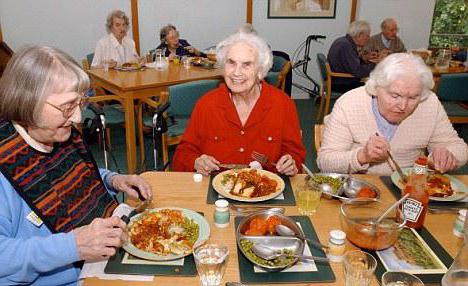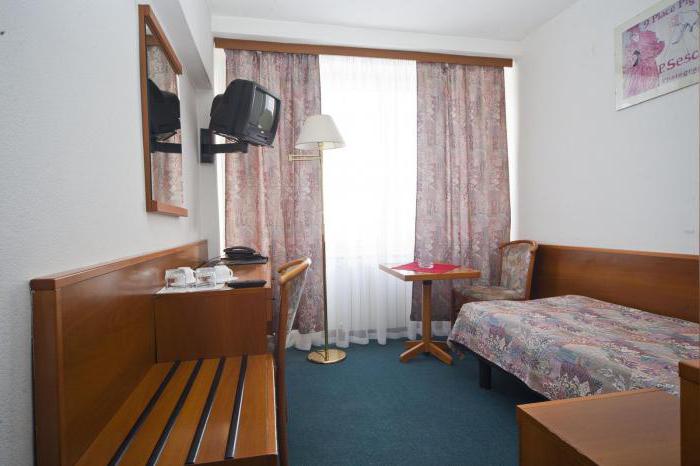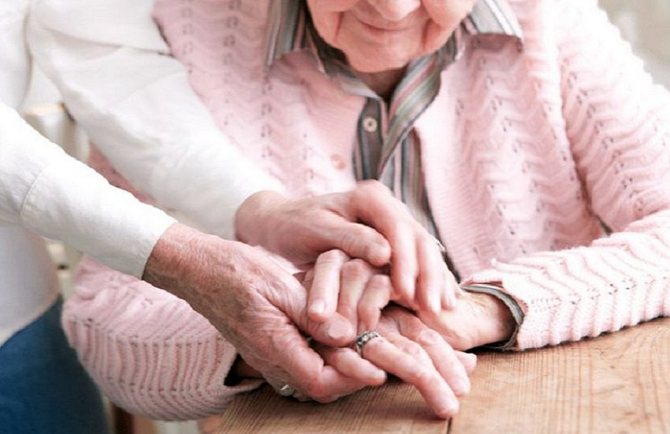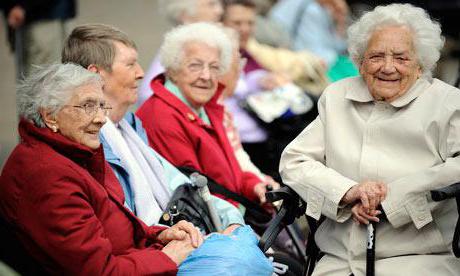In Russia, almost all families try to look after their elderly relatives. Usually the grandchildren take on this burden. But sometimes such a decision causes a lot of trouble, making the life of a young family unbearable. Then people try to go to state nursing homes. You can identify older people in them and visit them at specially designated times. The elderly will be under the constant supervision of specialists and will be able to receive timely medical assistance if necessary. But not everyone knows how to correctly place an old person in a boarding house or nursing home for free. In the case of commercial accommodation, everything is simple. But free nursing homes are not always available to everyone and not everyone. You will have to try hard to bring the idea to life.
Some statistics
A state nursing home is a place where older people who are unable to support themselves live. The majority of residents of the Russian Federation believe that sending old people to such institutions is a betrayal. Instead, you just need to grit your teeth and endure all the “delights” of dementia and other senile abnormalities. In fact, this practice is detrimental to families. It can destroy the unit of society.
Despite the fact that state nursing homes in Russia are not known for their comfort, such organizations are almost always overcrowded. Therefore, it will not be so easy to assign a grandmother or grandfather to such an institution.
A state nursing home can save a family from destruction and also have a beneficial effect on an elderly person. Here he will always be under the supervision of doctors.
Payment
You should pay attention to the fact that staying an old person in a boarding house or nursing home requires certain costs. Even government agencies charge for monitoring the elderly. This is normal practice.
A state boarding home for the elderly can be paid for:
- personally as a pensioner - 75% of his pension is taken away, and 25% is handed over;
- relatives of the resident.
Of course, most often the first scenario takes place. The choice of type of payment for accommodation is provided when a citizen registers for a boarding house.
List of personal items needed in a nursing home
To simplify the process of adaptation to your place of residence, it is recommended to take the following things with you :
- Personal hygiene products;
- orthopedic, dental prostheses;
- medicines, medicines, diapers, disposable sheets;
- if necessary, a ship;
- glasses;
- mobile phone with chargers;
- personal property;
- something for a hobby;
- clothing for indoor use and for walking during the season.
Clothing recommendation:
- robe or suit;
- for men - jersey trousers;
- for women - tights;
- several T-shirts, T-shirts;
- socks - three pairs, warm and thin;
- night dresses (2-3 pieces) for women and pajamas for men;
- a set of underwear;
- a warm sweater;
- outerwear for winter and off-season;
- headwear - panama hat or cap, warm hat, scarf;
- raincoat or umbrella;
- dresses and suits for celebrations;
- mittens or gloves, scarves.
Property issues
A huge issue is the issue of disposing of the old man's property. When placing a person in a state nursing home, the person’s property can be disposed of by relatives.
If a citizen does not have close people, then the following options are possible:
- The property is transferred to the boarding house/boarding school. Such a step is regarded as payment for living in an institution.
- The property is given to the state. This is possible if a single person has not registered ownership of the boarding house.
Accordingly, placing a grandmother or grandfather in a nursing home is not a reason for disinheritance. More precisely, the heirs may lose it, but the final decision is made either by the old man or his legal representative.

Reasons for refusal of admission to a state nursing home
State institutions for the elderly have a limited number of places, so only a small proportion of candidates are granted permission. The refusal to move into a state nursing home is not influenced by a person’s pension or work experience. Legitimate factors are prescribed in the legislation, they are:
- Availability of able-bodied relatives. Social authorities provide a place for the elderly, deprived of the help of loved ones. Otherwise, the refusal is justified.
- Maintaining ability to work. If, despite his age, the person does not have serious illnesses and is able to work, his application will be rejected.
- Some diseases. Tuberculosis. The open form of the disease poses a danger to others. In this case, the patient must undergo a course of treatment, undergo tests and, subject to recovery, re-apply the following year.
- Oncology. The lack of proper medical equipment allows us to admit only cancer patients with long-term remission. For inoperable severe patients, hospices are provided that provide comprehensive care.
- HIV infection. A serious illness requires close attention from the attending physician and long-term therapy. This is possible in the conditions of an infectious diseases hospital and AIDS centers.
- Epilepsy. Under standard conditions, it is impossible to control the condition of patients suffering from epilepsy. There are specialized institutions for this.
- Mental illnesses, except senile dementia, including Alzheimer's disease. In the stage of exacerbation of the condition, patients are transferred for treatment to specialized hospitals. With the onset of remission, the patient returns to the nursing home.
- Bad habits. People suffering from alcoholism and drug addiction cannot apply for a place in this institution. Smoking is possible, but subject to compliance with internal regulations.
What to do in case of refusal?
You can arrange home care from relatives, hire a nurse, enter into an agreement with a patronage service, or go to a private nursing home. And this is the best option for the elderly who need care, care and comfort.
Boarding house type
State nursing homes in the Moscow region and other regions of the Russian Federation are often overcrowded. Therefore, before assigning an elderly person somewhere, relatives must choose a specific place.
Boarding houses are divided into several types. Namely:
- government;
- private.
In the first case, residents are on state support. They are offered minimal comfort and medical care. Private nursing homes are expensive. They allow you to enjoy comfortable and varied living conditions.
In addition, you should pay attention to which citizens are placed in institutions. Boarding houses are divided into:
- for housing for ordinary elderly people;
- institutions for the disabled;
- organizations caring for bedridden people;
- boarding houses for mentally ill people (not to be confused with psychiatric hospitals).
State social nursing homes do not allow the elderly to remain alone. They can communicate with peers and live peacefully on the territory of the chosen organization.
Pros and cons of living in a nursing home
Benefits of living in a nursing home:
- ongoing medical care;
- safe and comfortable living environment;
- the possibility of unhindered visits to relatives;
- wellness program, including daily walks, medical and physiotherapeutic procedures;
- a balanced diet adapted to the needs of the elderly;
- the opportunity to lead a fulfilling lifestyle and spend leisure time;
- ability to communicate with other people;
- the opportunity to pursue your hobbies and interests.
Disadvantages include:
- Population density of public nursing homes;
- lack of separation of patients according to such important indicators as disease, social status and physical condition;
- lack of highly qualified personnel, inability to provide the full range of medical services needed by an elderly patient;
- environment: worn-out premises and equipment, lack of all necessary devices for comfortable living, lack of special premises for disabled people and people with disabilities;
- Geographical location of public nursing homes. Due to the remote location, visits to elderly patients by relatives and friends are kept to a minimum, which also negatively affects the morale of the elderly.
Voluntary decision
Once the relatives have decided which boarding house to send the grandparents to, it is necessary to take decisive action. The thing is that in Russia it is almost impossible to forcibly send a person to a state nursing home. This situation is relevant for dangerous patients, living with whom under the same roof causes harm to the family.

It is impossible to send an ordinary old man to a nursing home against his will. Therefore, you will have to secure his consent. If we are talking about an incompetent person, then the placement of an elderly person in a specialized institution occurs with the permission of his legal representative. For example, the closest relative or guardianship authorities.
How to register for a nursing home through social security? What documents are needed? Where to contact?
To receive a social voucher to a nursing home, an elderly person or his legal representative (children, spouse, parent, guardian) must contact a comprehensive social service center or a social protection center for elderly and disabled citizens at the citizen’s place of residence or stay.
Get to know our boarding houses with a short video:
There you will be given a list of documents required for registration of the trip.
List of necessary documents for obtaining a social voucher to a nursing home:
- a personal written application of a citizen for enrollment in inpatient social services, and for persons recognized as incompetent in accordance with the procedure established by law, on the basis of an application from their legal representative (guardian);
- a copy of an identity document;
- a certificate issued by the body providing pensions on the type and amount of the pension;
- a copy of the medical insurance policy of compulsory insurance of citizens and the insurance certificate of compulsory pension insurance;
- a certificate from housing and communal services organizations about the composition of the family, indicating the date of birth of each family member and family relationships;
- an extract from the medical record of an outpatient or inpatient patient (f. 027/u-80), issued in the clinic where the citizen was treated or observed, indicating the data of the mandatory medical examination of specialist doctors - therapist, psychiatrist, dermatovenerologist, oncologist, narcologist, phthisiatrician, infectious disease specialist; the degree of mobility is reflected - moves independently, is on bed rest, moves around the room, in a wheelchair, and a conclusion indicating the recommended type of inpatient social service institution;
- the conclusion of a medical commission with the participation of a psychiatrist that a person has a mental disorder that deprives him of the opportunity to stay in a non-specialized boarding school;
- HIV test result;
- the result of fluorography or the result of a sputum test for tuberculosis;
- a copy of the certificate from the medical and social examination bureau, a copy of the individual rehabilitation program (for persons recognized as disabled);
- a certificate, a copy of a certificate, certificate or other document confirming the right to benefits in accordance with current legislation (if there are benefits);
- a copy of the court decision declaring a person incompetent - (in relation to persons recognized as incompetent, as well as in relation to persons who, according to the conclusion of a medical commission, need to raise the issue of declaring them incompetent before the court);
- a copy of the decision of the guardianship and trusteeship authority on the appointment of a guardian (trustee) or on the assignment of the duties of a guardian (trustee) - (in relation to persons in need of establishing guardianship (trusteeship));
- a copy of the court decision recognizing the citizen as having limited legal capacity (if available);
- a copy of the decision of the guardianship and trusteeship authority to place a person in a psychoneurological institution (in relation to incapacitated citizens);
- a copy of the certificate of release from prison (for citizens released from prison)
The decision to allocate a voucher is made within 10 working days after you submit your application. There are many people who want to get permits; they often have to stand in line and wait for a place for months. In Moscow the situation is slightly better than in the region and regions.
Important!
You can indicate in your application those institutions where you would like to go. Among them may be not only state boarding schools, but also private ones, if they are in the register of social service providers. This opportunity is provided by Federal Law No. 442 and Moscow Government Decree No. 829 of December 26, 2014.
Important!
A referral for placement in a boarding house is valid for 30 calendar days.
Citizens enrolled in a nursing home are provided with a bed in rooms equipped with the necessary furniture.
Instructions
Finding a state nursing home in Moscow for a pension is not so difficult. However, as in any other region. In order to send an elderly relative to the chosen institution, you will need to follow some instructions. Otherwise, the registration process for a boarding house will become impossible.
To place a relative in a state nursing home, you need to:
- Apply for accommodation in a boarding house. This is done in the departments of social protection of the population.
- Pass a medical examination. You will need to obtain a complete list of existing diseases and abnormalities in an elderly person.
- Order a certificate from the BTI about the old man’s housing availability.
- Contact social security with the received papers.
- Wait for the ticket. Sometimes you have to wait for a while to get into the boarding house.
- Re-register documents for pension (if necessary).
It would seem that there is nothing difficult or incomprehensible. But in practice, registering a person in a nursing home causes a lot of problems. Especially if we are talking about an incapacitated citizen. For example, passing a medical commission can cause a lot of trouble.
Is it possible to place a relative in a nursing home without his consent?

Elderly people always need increased attention from others. This problem is especially acute in relationships with old people suffering from a serious illness - dementia (dementia). It is not always possible for a family to provide such patients with round-the-clock psychological and physical assistance, and grandparents flatly refuse to move somewhere. In such cases, loved ones wonder how to place an elderly relative in a nursing home without his consent. Article 9 of Federal Law No. 122 of August 2, 1995 clearly states that “...service is provided subject to voluntary consent.” The pensioner’s consent is confirmed by a statement that he personally signs. If a person believes that he is sane and can make decisions on his own, then he can always refuse to sign such a document. In this case, relatives need to use other methods of influence.
Many older people are afraid of the prospect of ending up in a nursing home. Attempts by relatives to place them in a boarding school cause a sharp negative reaction among the elderly. It is associated, first of all, with the feeling that they want to get rid of them, they are no longer needed. But if loved ones cannot be with an old person around the clock, and leaving him alone even for a short period of time is fraught with extremely unpleasant and life-threatening consequences, it is still necessary to make an attempt to place an elderly relative in a nursing home without his consent.
First of all, you need to calmly discuss this idea. Pre-select an institution that will optimally suit the needs of the old person, make inquiries about the qualification level of the medical staff and living conditions. Tell us about the boarding school, show photos, read reviews. Reasonably explain that there is no need to be afraid of living in a nursing home, because staying there has so many advantages: constant care and attention, properly selected nutrition, medical supervision, the opportunity to communicate with peers. Be sure to assure the old person that you will visit him regularly. Perhaps such a conversation will convince the pensioner, and he will agree to move to a boarding school.

It is possible to place an old person in a nursing home without his consent in the cases specified in Article 15 of the Federal Law “On Social Services for Elderly Citizens and Disabled Persons”:
- if there is no care from loved ones;
- if it is impossible to satisfy the vital needs of an old person;
- if the elderly person is declared incompetent based on a court decision.
To place a person in a nursing home without his consent, it is necessary to prove that he cannot care for himself, that such existence poses a threat to his life or health. Representatives of the pensioner submit an application to the social organization, after which the authorized body verifies the information received. Testimony from neighbors and a visual inspection of living conditions may serve as evidence that it is vital to place the old man in a boarding school. The commission also determines the physical and psychological condition of the elderly person.
It is possible to place an old person in a state nursing home without his consent if his incapacity is confirmed. To do this, relatives need to apply to the court with a corresponding request.
When submitting documents to the social service, a copy of the court decision is additionally attached to the papers. Federal Law 442 of December 28, 2013 defines a group of people who need social care and support. Circumstances leading to a deterioration in living conditions are grounds for providing state assistance. It is possible to place an elderly person in a nursing home without his consent after social authorities have been provided with evidence of the feasibility of this decision. Such evidence may be the fact that relatives live in another city, the presence of loved ones in places of detention, work associated with long business trips, etc.
We recommend
“How to register a grandmother in a nursing home: collecting documents and preparing a pensioner” Read more
Who is eligible
You are allowed to apply to a state boarding home for the elderly either personally or through a legal representative. But not everyone can count on help from the state.

The thing is that state boarding homes for the elderly and disabled, despite modest living conditions, are overcrowded. Therefore, you will have to wait for a voucher from social protection. Without it, you won’t be able to stay in a boarding house for free.
In addition, only women over 55 years of age, men over 60, as well as disabled people of the 1st and 2nd groups can count on government support when assigned to a nursing home. Persons incapacitated are also allowed to be placed in a specialized institution for permanent residence.
Documents for registration
To register a person in a state home for the disabled and elderly, some documents will be required. Namely:
- the applicant's identification document (preferably a passport);
- compulsory health insurance policy;
- medical report on the citizen’s state of health;
- certificates of disability (if available);
- SNILS;
- pensioner's ID.
As a rule, collecting documents is not difficult. Except that some difficulties arise when passing a medical commission to be assigned to a boarding house.
Where to go for help in Moscow
Many people are interested in where they can find state nursing homes in the Moscow region. Prices for accommodation in private boarding houses often exceed 100,000 rubles per month. Not everyone has this amount. Therefore, we have to look for government agencies.

There are more than enough of them in Moscow and the Moscow region. But all institutions are still filled to the maximum. Today you can seek help from the following organizations:
- boarding houses for labor veterans;
- boarding house for science veterans of the Russian Academy of Sciences;
- psychoneurological boarding schools;
- Gerontopsychiatric Mercy Center (Shipilovsky Avenue, 31/2);
- house of cinema veterans (Nezhinskaya, 5);
- house of Yablochkina stage veterans (Entuziastov Highway, 88).
Private nursing homes are also common in cities. There are a huge number of them. Finding a place in such institutions is much easier than it seems.
Prices for services
State nursing homes for bedridden patients and others, as we have already found out, do not provide services completely free of charge. How much will you have to pay for accommodation in a boarding house in one case or another?
In general, a citizen is asked for 75% of his pension. But the majority of the institutions studied offer a price list with specific services.
State nursing homes in the Moscow region offer the following prices:
- accommodation in a single superior room - 1,774 rubles;
- stay in a single two-room room - 3047 rubles 20 kopecks;
- one-room double room - 1523 rubles 60 kopecks;
- triple room - 1015 rubles 73 kopecks.
Usually the price includes five meals a day. But as a rule, citizens simply register old people in boarding houses to pay for their pension. Therefore, you should not think about how much to pay to a state nursing home in St. Petersburg or Moscow.
Private boarding - a dignified old age
So we got acquainted with the process of registering a person in state nursing homes in the Moscow region and beyond. But as has already been emphasized, getting a place in a state-supported nursing home if you have able-bodied children and other relatives is problematic. Actually impossible.
Therefore, some decide to enroll in a private nursing home. Such organizations offer the most comfortable living conditions for a fee. Some compare them to hotels. To apply, it is enough to collect the previously listed documents (without a voucher and applications to social protection) and contact the selected institution. The boarding house doctors will conduct an examination themselves and help with the preparation of the relevant papers.

How to prepare a person for registration in a nursing home
It is quite understandable that changing a place of residence is a stressful situation for every elderly person. It doesn’t matter how long the elderly relative will move to the institution (even if it’s a few days), preparation is necessary in any case. You should have a detailed conversation with the elderly person, show him photos and videos of the new place.
There are situations in which it is impossible to find a compromise, when it is not possible to live together with an elderly relative, but he refuses to be with a nurse. Then he can perhaps give his consent to registration in a boarding house. However, you shouldn’t delude yourself too much, since most often such peace turns out to be imaginary. In any case, such a serious decision as moving will not be easy for an elderly person, and psychological preparation in this matter will come in handy.
When starting a conversation on this topic, emphasize that moving into a nursing home will benefit him. Please note that it is important for you to be sure that your relative is in comfortable conditions, eats well, and spends time with interest and benefit for himself. The conversation should begin with your words of regret about how you worry about a loved one who spends little time in the fresh air, does not eat well enough, and whiles away his days in melancholy and despondency. Insist on how important it is for you to see him happy and satisfied with life.

Next, mention, for example, your friend’s grandfather, who had a wonderful holiday in a park hotel for the elderly, where Western quality standards were met, beautiful nature, a pleasant company of peers and many other attractive advantages. Start the news about a possible move with a proposal for a joint visit to the institution. Tell your relative that he himself will be able to see the delights of a different life, filled with comfort and interesting activities.
- Check with the pensioner what exactly he means by the concept of comfort, what exactly he needs for this. Write down all the mentioned aspects in detail. Today there are boarding houses in which, for example, future guests are allowed to bring an indoor flower with them from home.
- It is advisable to come to the boarding house on a tour with an elderly relative. It’s good if your visit coincides with some interesting event, which you can find out about in advance from the administration. If this is not possible, then arrange a joint viewing of photographs and videos about the establishment.
- Be sure to say that you will visit your relative, call, communicate via Skype, and also emphasize that you will always be aware of his life, you will be interested in everything that happens to him.
- Insist that what is of utmost importance to you is how your relative eats, how he spends his time, and in what conditions he lives.
Try to convey to your loved one that you are offering him registration not in a typical nursing home, but in an institution of a completely different level, which is characterized by many advantages.
Of course, no matter how ideal the conditions of the new life are, homesickness will become inevitable. You should emphasize that the boarding house you choose provides 24-hour visits, and there are also secluded places where you can meet and quietly chat or take a walk together.
A high-quality private nursing home can even be compared to a resort.
Don’t forget about the opportunity to take with you some memorable things for an elderly person, be it photographs, personal items or little things dear to your heart.
When the difficulties are over, the registration is completed and your loved one finds himself in a new place where caring staff works, we recommend that you do not reduce your participation.
The adaptation period takes approximately one week to a month. Not always even a young and full of energy person can easily integrate into a new way of life. Elderly people usually at this stage begin to demand increased attention to themselves, experiencing anxiety and restlessness.
It is best at this time to try to call your elderly relative more often and show interest in his activities and new way of life. Ask him about:
- well-being;
- new events;
- what pleases and what worries;
- his affairs and activities.
It is equally important to remain calm and confident yourself, since your anxiety can be passed on to a loved one. Try to tell him as much as possible about what is happening in your life, come to him with relatives and friends, and then he will not feel deprived of participation in family affairs.
We recommend
“First aid for the elderly: what you need to know about it” Read more






